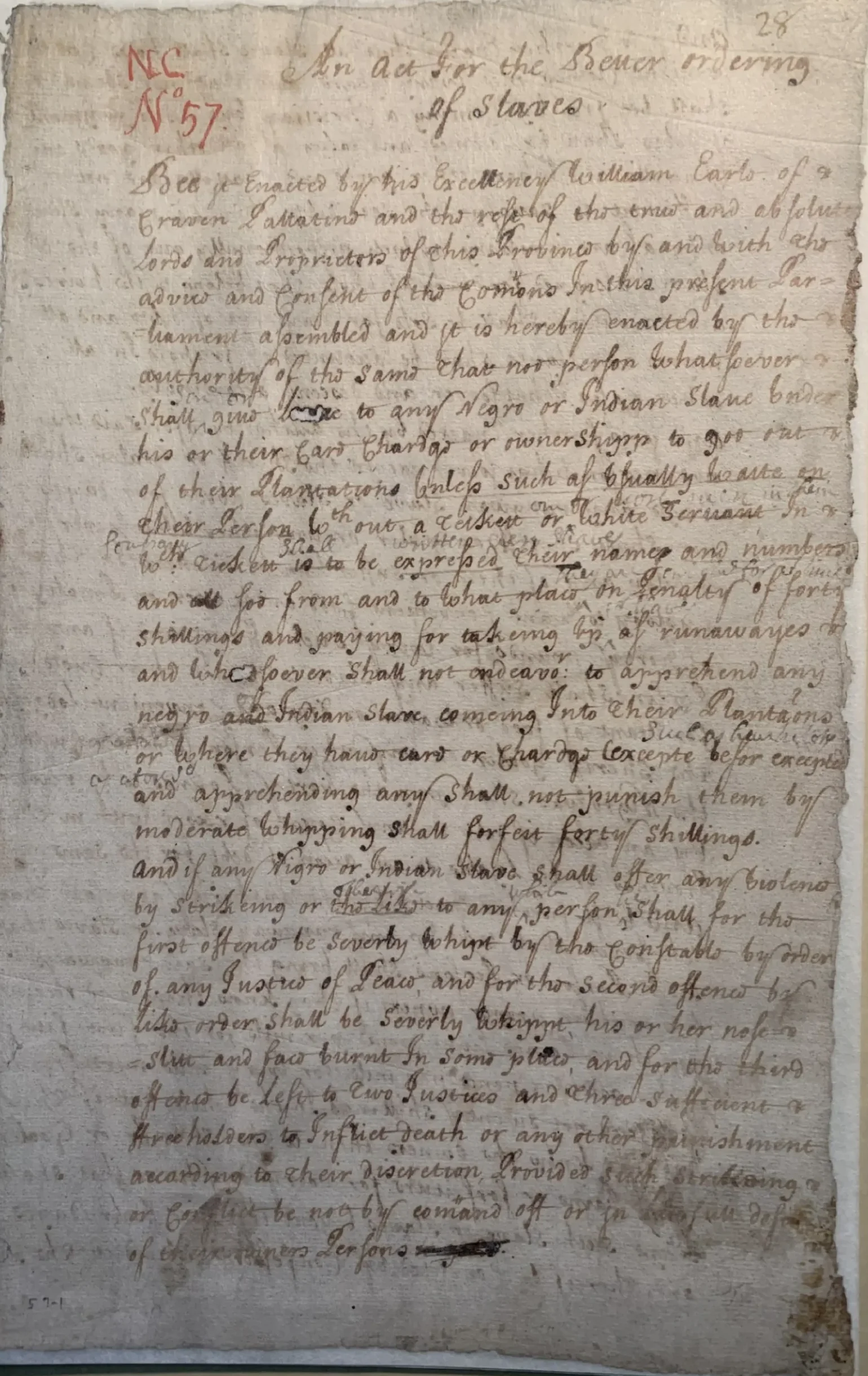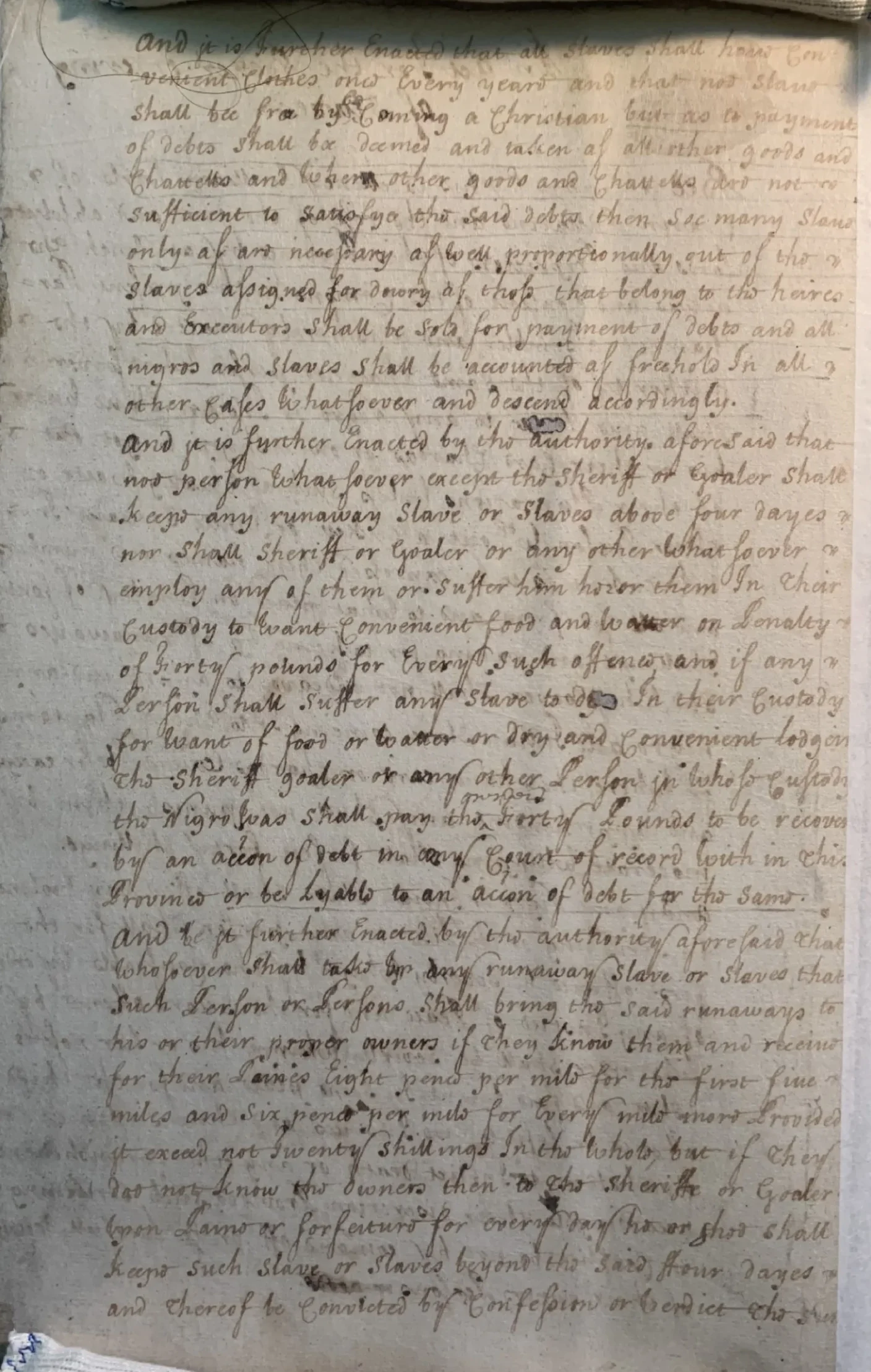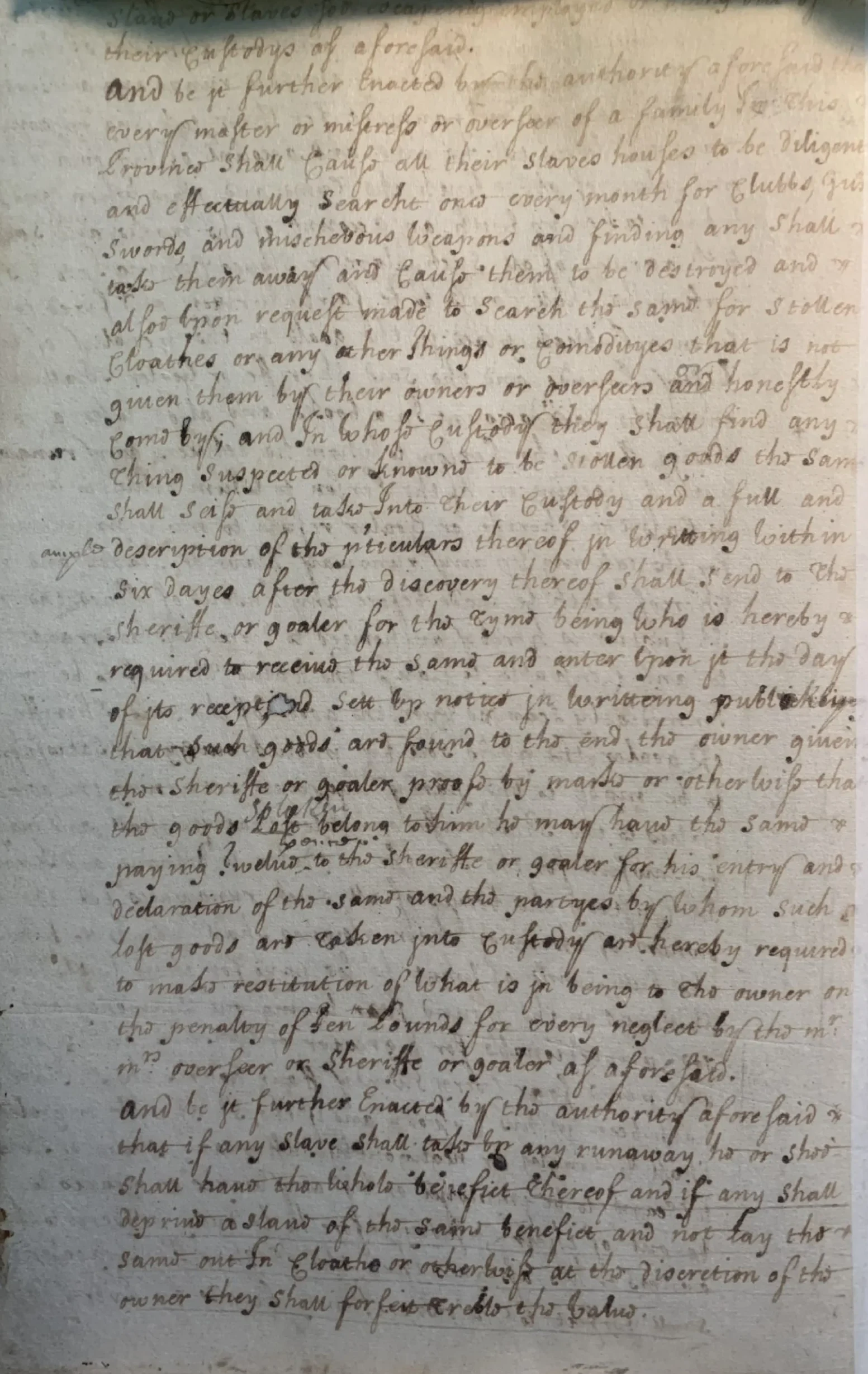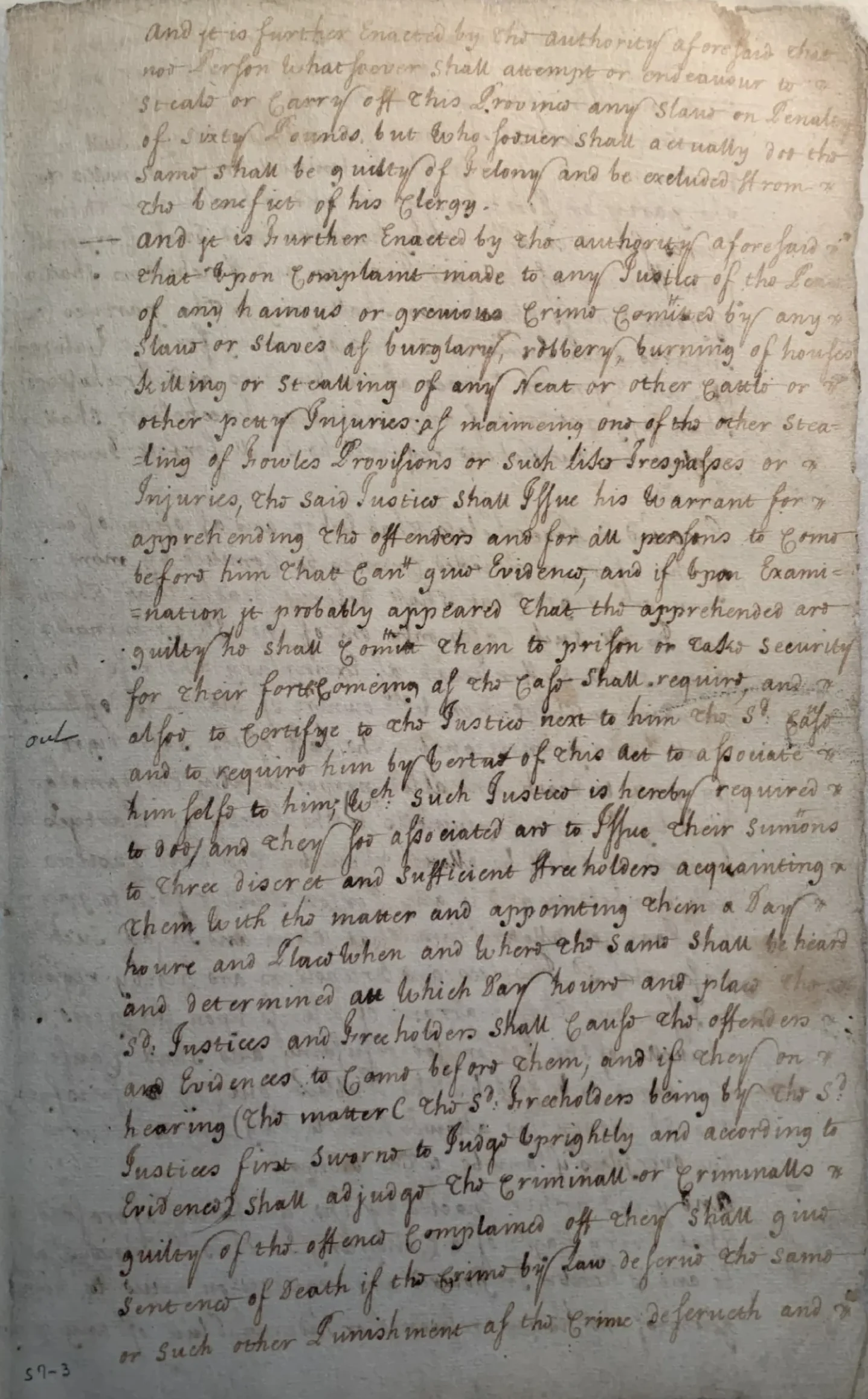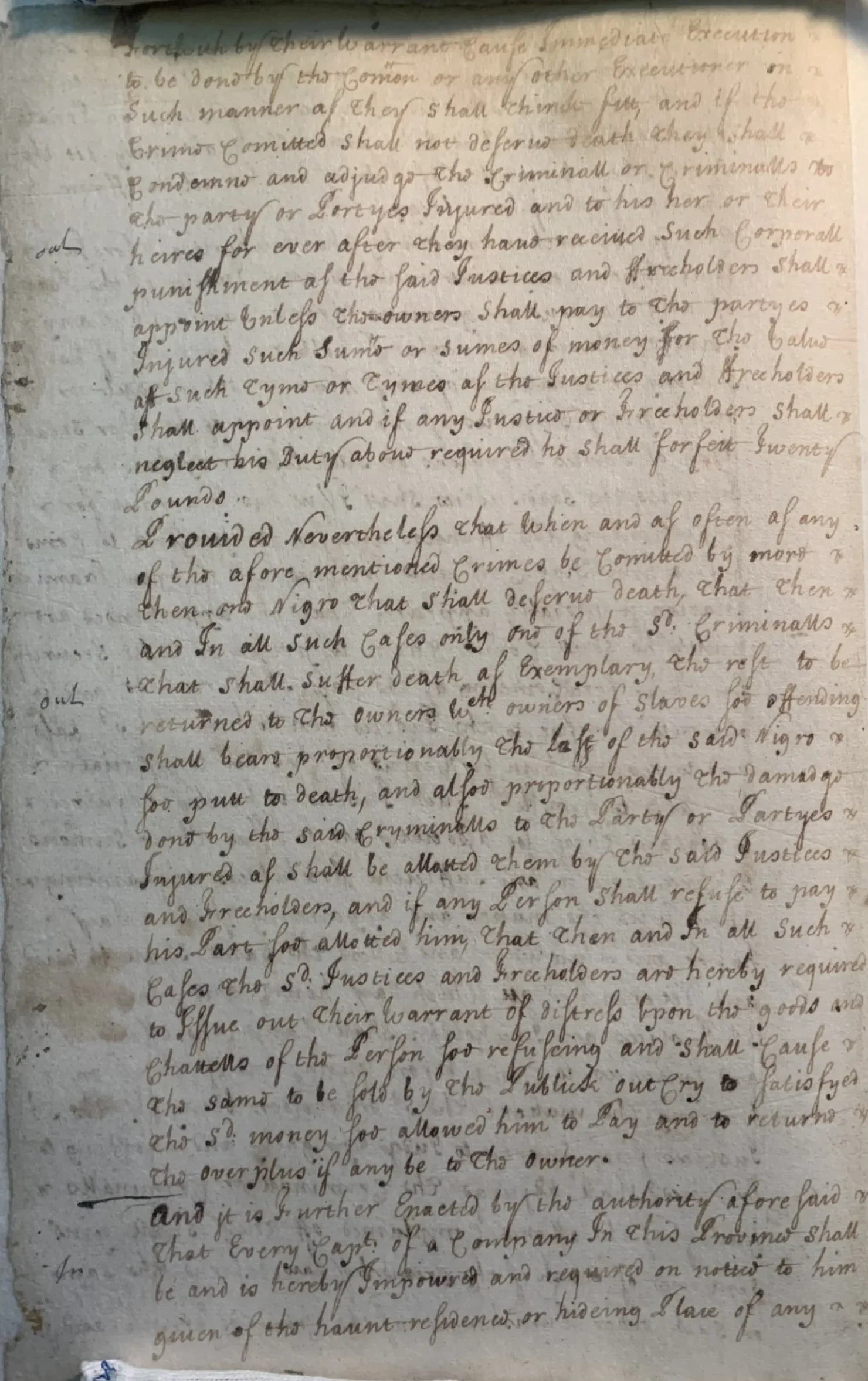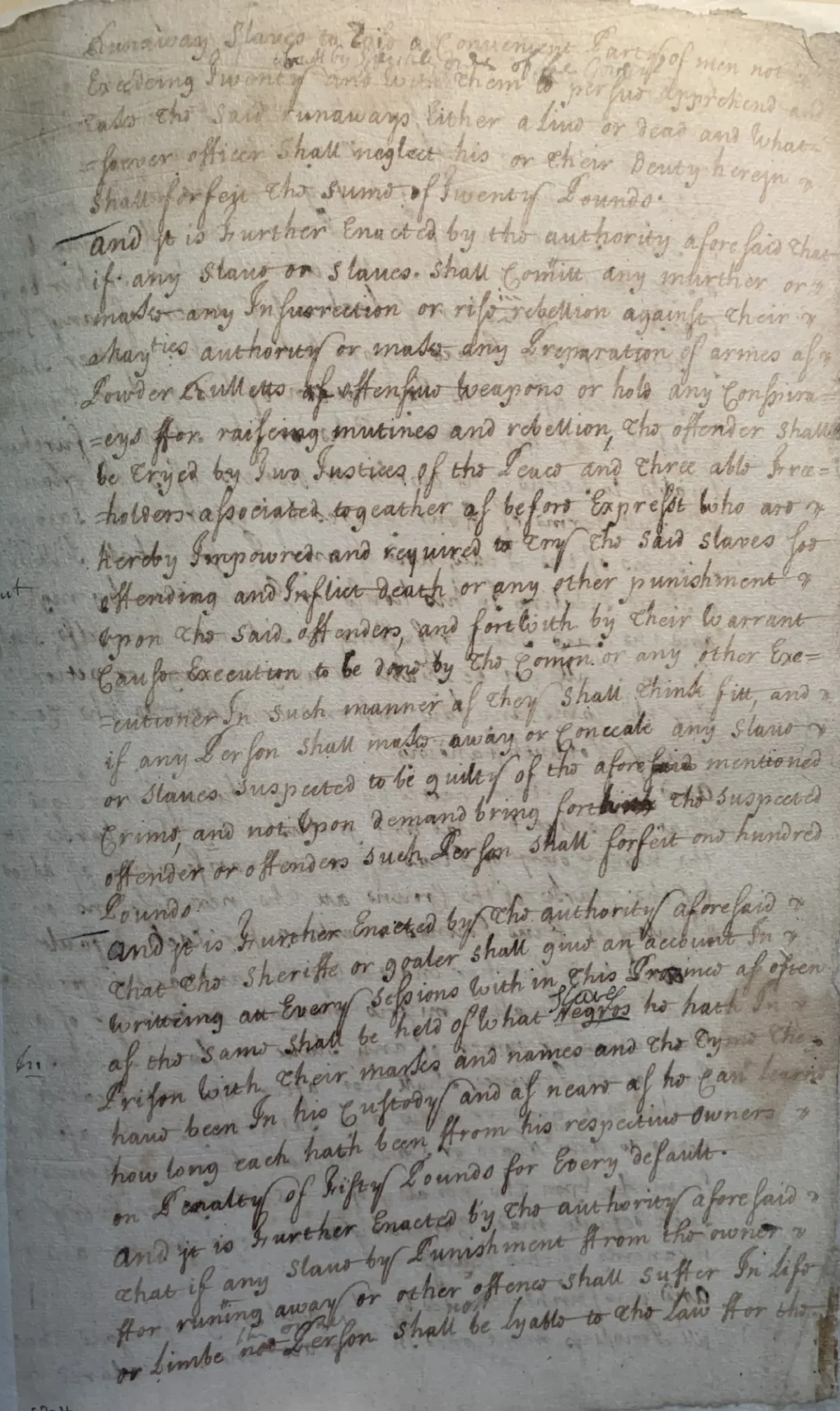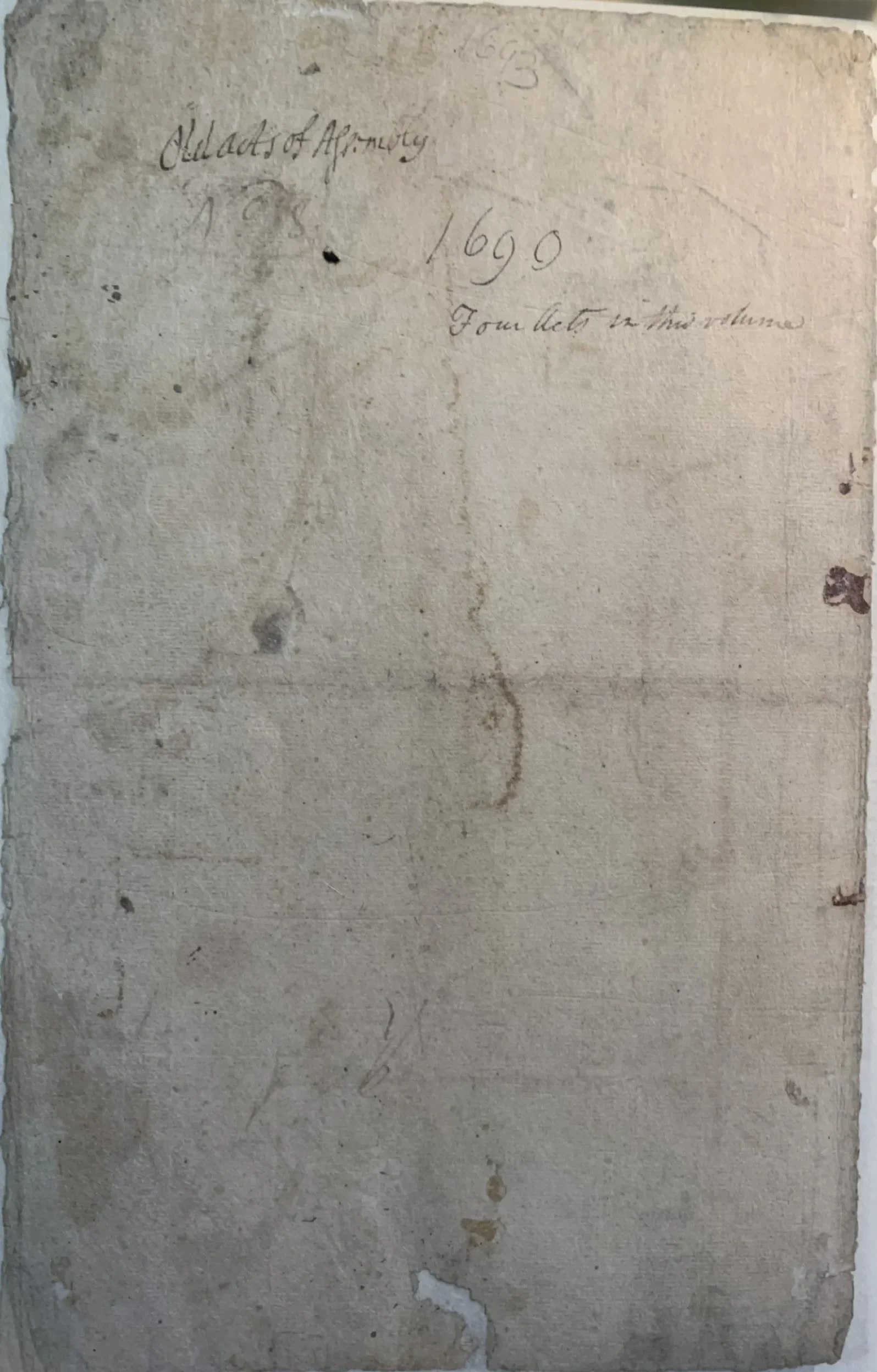ACT 57
1690 Carolina Slave Code
Introduction
The 1690 Carolina slave code was the first comprehensive slave code enacted in a mainland colony in the British Empire in America. It echoes and was no doubt informed by earlier codes enacted by Barbados and Jamaica, British colonies in the Caribbean. At the time it was created, the colony had been functioning on some level for almost three decades; even without the comprehensive code, many colonists already claimed significant numbers of both indigenous and African people as their slaves. Several earlier laws related to different questions of slavery and servitude, including several in the late 1680s, but many of the earlier laws (this was #57) do not survive.
This code was created during a crisis of political turmoil in the colony and in the English empire more broadly. In England, James II had been deposed in November 1688 in the Glorious Revolution; he was succeeded by William III of Orange and Mary II. At the core of the conflict that led to the Glorious Revolution were concerns over James II’s vision of royal power relative to Parliament and his promotion of Catholicism. This conflict over the royal succession had also led to heated political struggles in many American colonies, as factions contested the erosion of colonial prerogatives and control over self-government threatened by James II’s policies.
Carolina was a proprietary colony, under the rule of the eight Lords Proprietors by virtue of their charter from King Charles II (James II’s predecessor). Yet, within the colony, a growing group of wealthy planters and enslavers, many transplants from Barbados, held substantial economic power and a majority or representatives in the “Parliament,” which was composed of twenty elected members (one from each precinct) and eight members appointed by the proprietors.1 Jack P. Greene, “Colonial Carolina and the Caribbean Connection.” The South Carolina Historical Magazine 88, no. 4 (1987): 192-210; The influential group of colonists was known as the Goose Creek Men, since many of their estates were adjacent to Goose Creek.
While the original proprietors had sponsored their migration from Barbados, beginning in 1663, especially as the proprietors changed directions, they became increasingly frustrated. First, the proprietors attempted to assert increased control, in the form of revisions to the governing Fundamental Constitutions, imposing oaths on members of the assembly, and appointing pliable governors. Second, the governors appointed by the proprietors tried to maintain a monopoly over trade with indigenous people, and that position was often abused. Many of the Goose Creek men sought to purchase hides and indigenous slaves. Third, the proprietors were keen to limit tensions with the Spanish colony to the south, which frustrated some of the Goose Creek Men especially after a surprise attack in 1686.2 Edward Rugemer, Slave Law and the Politics of Resistance in the Early Atlantic World. (Cambridge: Harvard University Press, 2018). 59-66
During the late 1680s, the Goose Creek Men repeatedly engaged in conflict with Governor James Colleton, a brother of proprietor Peter Colleton, who closely hewed to a shifting proprietary policy, but whom they accused of corruption, and unnecessarily imposing martial law, and creating laws without their elected assembly (parliament). In 1690, Seth Sothell, a different proprietor, arrived in South Carolina after being ransomed from years of detention by North African pirates. Sothell claimed he had superior authority to Colleton and thus had the right to be governor instead (on the grounds that Colleton had unjustly imposed martial law), and with the assistance of the Goose Creek men, staged an insurrection against Colleton. He then imprisoned some of the former members of the parliament (appointed by other proprietors) and called for elections to a new “parliament”– twenty members to join the eight members appointed by the governor. This single house parliament/governor, convened by Sothell under contested circumstances, created this code.3L.H. Roper, “The 1701 ‘Act for the Better Ordering of Slaves’: Reconsidering the History of Slavery in Proprietary South Carolina.” William and Mary Quarterly 64, no. 2 (2007): 395-418
After the remaining proprietors in England heard of Sothell’s actions in Carolina, they removed him from office along with many of his allies. They appointed a new governor, Philip Ludwell, who repealed many of the laws enacted under Sothell’s tenure. Despite differences with Sothell’s government on many matters, the new government agreed on the importance of a comprehensive code governing slavery. The proprietors repealed this law in September 1691, but subsequent Carolina Parliaments & Governors supposedly re-adopted many of these provisions concerning slavery in 1693 (though no copies of those laws can be located), and certainly borrowed heavily from this code again in 1696. 4On its repeal in September, 1691, see TNA CO 5/288, pp. 186-187; Thomas J. Little, “The South Carolina Slave Laws Reconsidered, 1670-1700.” The South Carolina Historical Magazine 94, no. 2 (1993): 86-101
If one examines this document in comparison to the 1661 Barbados slave code and the 1664 Jamaica slave code, the influence is clear. Many clauses are copied over, at times with slight alterations of wording. But the differences are also notable. Both the Barbados and Jamaica slave codes begin with a long preamble which lays out the justification for enacting such a code, describing the situation of the colony and stating that the laws of England do not provide a sufficient precedent for their situation. The Carolina slave code dispenses with the preamble altogether. Another notable difference lies in the categories used to describe enslaved and free people. Both the Barbados and Jamaica laws contrast “Negroes” with “Christians.” The Carolina law, in contrast, uses “White.” The Carolina code also regularly discusses both “Negroes” and “Indians” as enslaved persons. While we know that indigenous people, both from the Caribbean and mainland North America, formed part of the enslaved populations in late seventeenth century Jamaica and Barbados, the majority of the enslaved population in both places were of African descent. In Carolina, in contrast, enslaved indigenous people composed a very substantial proportion of the enslaved population. 5Edward Rugemer, “The Development of Mastery and Race in the Comprehensive Slave Codes of the Greater Caribbean during the Seventeenth Century.” William and Mary Quarterly 70, no. 3 (2013): 429-458; David Barry Gaspar, “With a Rod of Iron: Barbados Slave Laws as a Model for Jamaica, Carolina, and Antigua, 1661-1697.” in Darlene Clark Hine and Jacqueline McLeod, eds. Crossing Boundaries: Comparative History of Black People in Diaspora. (Bloomington, IN: Indiana University Press, 2001): 343-366. Indeed, many of the framers of this act were heavily engaged in the indigenous slave trade.
Historians of early colonial Carolina have almost invariably relied on an edition of Carolina’s early laws compiled in the 1840s by David McCord for the text of the 1690 slave code and many other laws about slavery in the colony. 6“An Act for the Better Ordering of Slaves,” in The Statutes at Large of South Carolina, ed. Thomas Cooper and David J. McCord, vol. 7 of 10, Acts Relating to Charleston, Courts, Slaves, and Rivers, ed. David J. McCord (Columbia, S.C.: printed by A. S. Johnston, 1840), 343-347 It is thus particularly instructive to examine the manuscript version in relation to McCord’s transcript. Most notably, the manuscript includes a number of amendments and editions, underlines, strike-throughs, and marginalia. It is not yet clear if these were made contemporaneous with the act’s initial enactment, or reflect, for example, preparations for crafting the 1696 code presented elsewhere on this site. Regardless, McCord’s version does not show any of these changes.
– Michael Becker and Holly Brewer
Guiding Questions:
- What does this law suggest about the primary concerns Carolina’s lawmakers had about slavery and the actions of enslaved people?
- Compare this code with the earliest Barbados and Jamaica slave codes. Are there any similarities? Do you notice any significant differences? How can you categorize those differences? Why do you think?
- Does a pattern stand out to you about the amendments and adjustments made to the text? Why or why not?
Further Reading
- Thomas J. Little, “The South Carolina Slave Laws Reconsidered, 1670-1700.” The South Carolina Historical Magazine 94, no. 2 (1993): 86-101
- L.H. Roper, “The 1701 ‘Act for the Better Ordering of Slaves’: Reconsidering the History of Slavery in Proprietary South Carolina.” William and Mary Quarterly 64, no. 2 (2007): 395-418
- Edward Rugemer, “The Development of Mastery and Race in the Comprehensive Slave Codes of the Greater Caribbean during the Seventeenth Century.” William and Mary Quarterly 70, no. 3 (2013): 429-458
Sources
The South Carolina Historical Magazine 88, no. 4 (1987): 192-210.
(Cambridge: Harvard University Press, 2018): 59-66.
William and Mary Quarterly 64, no. 2 (2007): 395-418.
The South Carolina Historical Magazine 94, no. 2 (1993): 86-101.
William and Mary Quarterly 70, no. 3 (2013): 429-458.
Darlene Clark Hine and Jacqueline McLeod, eds. Crossing Boundaries: Comparative History of Black People in Diaspora.
(Bloomington, IN: Indiana University Press, 2001): 343-366.
vol. 7 of 10, Acts Relating to Charleston, Courts, Slaves, and Rivers, ed. David J. McCord (Columbia, S.C.: printed by A. S. Johnston, 1840), 343-347.
Cite this page
“1690 Carolina Slave Code,” ed. Michael Becker and Holly Brewer. Slavery Law & Power in Early America and the British Empire – Accessed 2nd March 2026. https://slaverylawpower.org/nhprc-sample-documents/1690-carolina-slave-code/
[Original Source: “An Act for the Better Ordering of Slaves.” # SCDAH S165001 General Assembly Acts, Act 57 (1690/1). South Carolina Department of Archives and History.]
Content Warning
Some of the works in this project contain racist and offensive language and descriptions that may be difficult or disturbing to read. Please take care when reading these materials, and see our Ethics Statement and About page.
Page 1
{28}
{NC No. 57}
An Act For the Better ordering
of Slaves
Bee it Enacted by his Excellency William Earle of
Craven Pallatine and the rest of the true and absolute
Lords and Proprietors of this Province by and with the
advice and Consent of the Comons In this present Par-
liament assembled and it is hereby enacted by the
authority of the same that noe person whatsoever
shall [?] or issue give [licence?] to any Negro or Indian Slave Under
his or their Care Chardge or ownershipp to goo out
of their Plantations Unless such as usually Waite on
their Person without a Tickett or [any person ?] in [?] White Servant In
[Perhaps] Which Tickett is to shall be written every Slave expressed their names and numbers
and all soe from and to what place They are [?] and for [?] on Penalty forof forty
shillings and paying for takeing up said Slave as runawayes
and whosoever shall not endeavor to apprehend any
negro or and Indian Slave, comeing Into their Plantaons
or Where they have care or Chardge (excepte such as [?] befor excepted
as aforesaid and apprehending any shall not punish them by
moderate whipping shall forfeit forty shillings.
And if any Nigro or Indian Slave shall offer any violence
by strikeing or the like otherwise to any white person he shall for the
first offence be severely whipt by the Constable by order
of any Justice of Peace, and for the second offence by
like order shall be Severly Whippt, his or her nose
slitt and face burnt In some place, and for the third
offence be left to two Justices and Three sufficient
Freeholders to Inflict death or any other punishment
according to their discretion, Provided such strikeing
or Conflict be not by comand off or in lawfull defense
of their owners Persons or goods.
Page 2
And it is Further Enacted that all slaves shall have con-
venient Clothes once Every yeare and that noe slave
shall bee free by beComing a Christian but as to payment
of debts shall bee deemed and taken as all other goods and
Chattells and where other goods and Chattells are not so
sufficient to satisfye the said debts then soe many slaves
only as are necessary as well proportionally out of the
slaves assigned for dowry as those that belong to the heires
and Executors shall be sold for payment of debts and all
nigros and slaves shall be accounted as freehold In all
other Cases Whatsoever and descend accordingly.
And it is further Enacted by the authority aforesaid that
noe person whatsoever except the Sheriff or Goaler shall
keepe any runaway Slave or Slaves above four dayes
nor shall Sheriff or Goaler or any other whatsoever
employ any of them or suffer him her or them In Their
Custody to want Convenient food and watter on Penalty
of Forty pounds for Every such offence, and if any
Person shall suffer any slave to dye In their Custody
for want of food or Watter or dry and convenient lodgin
The Sheriff goaler or any other Person in Whose Custody
the Nigro was shall pay the owner Forty Pounds to be recover
by an accon*action of debt in any Court of record with in this
Province or be Lyable to an accon of debt for the same.
And be it further Enacted by the authority aforesaid That
whosoever shall take up any runaway slave or slaves that
such Person or Persons shall bring the said runaways to
his or their proper owners if They know them and receive
for their Paines Eight pence per mile for the first five
miles and six pence per mile for Every mile more Provided
it exceed not twenty shillings In the whole, but if They
doe not know the owners then to The Sheriffe or Goaler
upon Paine or forfeiture for every day he or shee shall
keepe such Slave or Slaves beyond the said Four dayes
and Thereof be Convicted by Confession or Verdict The sum
Page 3
of Twenty Pounds to be Leavyed by the Sheriffe or Goaler
or his Lawfull deputy upon the goods and Chattells of the
Persons soe Neglecting to bring the said runaway and noe
person shall receive payment for their takeing up any
slave or slaves till he give and account to the Keeper or Goaler of his own Name
and place of abode with the Tyme and place when and
where taken up with an account of the most distinguishing markes and sex
{name} which account of all such slave or slaves Coming Into his
Custody the Sheriffe or Goaler shall Cause to be fairly written and fixed
upon a Publick place in the goale on the penalty of
Fifty Pounds and the said Sheriffe or Goaler shall
enter the said account In a booke and alsoe take a
receipt from the Person to whom he delivers any runaway
with the name & place of abode a description of the Person to whom delivered and
In Case The Sheriffe or Goaler refuse to make payment
for the takeing up any runaway Slave or Slaves and
Thereof Ooath be made before any Justice of Peace the
said Justice is hereby authorized to direct the Warrant
to any Constable to Cause the Value Thereof to be
immediatly Leavyed Upon the goods of the said Sheriffe
oR goaler the goods to be sold by publick outcry and satisfacon*satisfaction
to be made to the party aggreeved complainant returning the over-
plus*surplus to the said Sheriffe or goaler And that it shall and may
be Lawfull for the Sheriffe or goaler to detaine and keepe
In Custody the bodyes of all such runaways till the
owners of them or their assignes shall pay Unto him
the full sums of what he soe payd for them with Two
Shillings in the pound foar laying out the money and
soe proportionable for a greater or lesser sume and alsoe
six pence foar Every Twenty Four houres the said slave
hath been in his Custody, and if the said Sheriffe or goaler
shall Willingly or negligently suffer any slave or slaves
to Escape or be imployed or by any wayes or meanes to
be out of their Custody before he be duely delivered to the
owners or his assignes then the said Sheriffe or goaler
shall forfeit to the owners Thirty Pounds for Every
Page 4
slave or slaves soe escaping imployed or [being?] out of
their custodys as aforesaid.
And be it further Enacted by the authority aforesaid that
every master or mistress or overseer or a family In This
Province shall Cause all their slaves houses to be diligently
and effectually searcht once every month for Clubbs, Guns,
Swords, and mischevous Weapons and finding any shall
take them away and Cause them to be destroyed and
alsoe upon request made to Search the same for Stollen
Cloathes or any other Things or Comodityes that is not
given them by their owners or overseers and or honestly
come by; and In Whose Custody they shall find any
Thing suspected or knowne to be stollen goods the same
shall seise and take Into Their Custody and a full and
{ample} description of the pticulars*particulars thereof in Writting Within
six dayes after the discovery thereof shall send to The
sheriffe or goaler for the Tyme being Who is hereby
required to receive the same and enter upon it the day
of its receipt, and sett up notice in writteing publickly
that such goods are found to the end the owner giveing
the Sheriffe or goaler proofe by marke or otherwise that
the goods post [so taken] belong to him he may have the same
paying Twelve pence to the Sheriffe or goaler for his entry and
declaration of the same and the partyes by whom such
lost goods are taken into Custody are hereby required
to make restitution of what is in being to The owner on
the penalty of Ten Pounds for every neglect by the master
mistress overseer or Sheriffe or goaler as aforesaid.
And be it further Enacted by the authority aforesaid
that if any slave shall take up any runaway he or shee
shall have the whole benefit Thereof and if any shall
deprive a slave of the same benefiet and not lay the
same out in Cloathe or otherwise at the discretion of the
owner they shall forfeit Treble the Value.
Page 5
And it is further Enacted by the Authority aforesaid that
noe Person Whatsoever shall attempt or endeavour to
steale or Carry off This Province any slave on Penalty
of sixty Pounds, but who soever shall actually doe the
same shall be guilty of Felony and be excluded From
The benefit of his Clergy.
And it is Further Enacted by the authority aforesaid
That Upon Complaint made to any Justice of the Peace
of any hainous*heinous or grevious Crime Comitted by any
Slave or Slaves as burglary, robbery, burning of houses
killing or stealling of any Neat or other Cattle or
other petty Injuries as maimeing one of the other Stea-
ling of Fowles Provisions or such like Trespasses or
Injuries, The said Justice shall Issue his Warrant for
apprehending The Offenders and for all persons to Come
before him That Can give Evidence, and if Upon Exami-
nation it probably appeared That the apprehended are
guilty he shall comitt Them to prison or take security
for Their forecomeing as the case shall require and
{out} alsoe to Certifye to the Justice next to him the said Case
and to require him by Vertue of This Act to associate
himselfe to him; which such Justice is hereby required
to doe and They soe associated are to Issue Their Sumons
to Three discret and sufficient Freeholders acquainting
Them with the matter and appointing them a Day
houre and Place When and Where The Same shall be heard
and determined att Which Day houre and place the
said Justices and Freeholders shall Cause the offenders
and Evidences to Come before Them; and if they on
hearing (the matter) the said Freeholders being by the said
Justices first sworne to Judge uprightly and according to
Evidence) shall adjudge the Criminall or Criminalls
guilty of the offence Complained off they shall give
Sentence of Death if the Crime by Law deserve the same
or such other Punishment as the Crime deserveth and
Page 6
Forthwith by Their Warrant Cause Immediate Execution
to be done by the Comon or any other Executioner in
Such manner as they shall think fitt, and if the
Crime Comitted shall not deserve death they shall
Condemne and adjudge the Criminall or Criminalls to
the party or Partyes Injured and to his her or their
{out} heires for ever after They have received such Corporall
punishment as the said Justices and Freeholders shall
appoint Unless The owners shall pay to The partyes
Injured such Sums or sumes of money for the Value
at such Tyme or Tymes as the Justices and Freeholders
shall appoint and if any Justice or Freeholders shall
neglect his Duty above required he shall forfeit twenty
Pounds.
Provided Nevertheless That when and as often as any
of the afore mentioned Crimes be Comitted by more
then one Nigro That shall deserve death, That Then
and In all such Cases only one of the said Criminalls
{out} That shall suffer death as Exemplary, The rest to be
returned to The Owners which owners of Slaves soe offending
shall beare proportionably The loss of the said Nigro
soe putt to death, and also proportionably the damadge
done by the said Cryminalls to The Party or Partyes
Injured as shall be allotted Them by the said Justices
and Freeholders, and if any Person shall refuse to pay
his Part soe allotted him, That Then and In all such
Cases the said Justices and Freeholders are hereby required
to Issue out Their Warrant of distress upon the goods and
Chattells of the Person soe refuseing and shall Cause
The same to be sold by the Publick OutCry to Satisfye
the said money soe allowed him to Pay and to returne
the overplus if any be to The Owner.
And it is Further Enacted by the authority aforesaid
That Every Captain of a Company In this Province shall
be and is hereby Impowred and required on notice to him
given of the haunt residence or hideing Place of any
Page 7
runaway Slaves to Raise a Convenient Party of men not
Excedeing Twenty except by Speciall order of the Council and with Them to persue apprehend and
take the said runaways Either alive or dead and what-
soever officer shall neglect his or Their Deuty herein
shall forfeit The sume of twenty Pounds.
And it is further Enacted by the authority aforesaid That
if any slave or slaves shall comitt any murther*murder or
make any Insurrection or rise in rebellion against Their
Majesties authority or make any Preparation of armes as
Powder Bulletts as offensive weapons or hold any Conspira-
cys For raiseing mutines and rebellion, The offender shall
be Tryed by Two Justices of the Peace and Three able free-
holders associated togeather as before Expresst who are
hereby Impowred and required to Try the said Slaves soe
{out} offending and Inflict death or any other punishment
upon the said offenders, and fortwith by their Warrant
Cause Execution to be done by the Comon or any other Exe-
cutioner In such manner as They shall Think fitt, and
if any Person shall make away or Conceale any slave
or Slaves suspected to be guilty of the aforesaid mentioned
Crime, and not upon demand bring forthwith the suspected
offender or offenders such Person shall forfeit one hundred
Pounds.
And it is further Enacted by The authority aforesaid
That The Sheriffe or goaler shall give an account In
writting att Every Sessions with in This Province as often
{In} as the same shall be hold of what Negroes Slaves he hath In
Prison with Their Marks and names and The Tyme They
have been In his Custody and as neare as he can learne
how long each hath been From his respective owners
on Penalty of Fifty Pounds for Every default.
And it is Further Enacted by The authority aforesaid
That if any Slave by Punishment From the owner
For runing away or other offence shall suffer In Life
or Limbe noe Person the owner shall not be Lyable to the Law for the
Page 8
same, but if any one out of willfullness wantoness or
bloody mindedness shall kill a slave he or she upon
due Conviction Thereof shall suffer three months
Imprisonnement Without Bayle or mainprize and
alsoe pay The sume of Fifty Pounds to The owner
of such slave, but if the Person soe offending be
a servant he or shall shall receive on his or her bare
Backe nine and Thirty lashes by order of any two
Justices of the Peace before whom The matter shall be
proved and after the Expiration of his or her tyme
with his or her master or mistress he or she shall be further
Lyable to serve The owner or owners of such slave
The full terme of Four yeares by order of the said
Justices of the Peace; in and if any Person shall kill
a slave stealing In his house or Plantation by night
and the said slave refuseing to submitt himselfe, such
Person shall not be Lyable to any damage or action
For the same any Law Custome or Usage to The Con-
trary Notwithstanding.
And it is further Enacted by The authority aforesaid
That This Act be read and publisht by the Clarke*clerk att
the next Court of Pleas after The ratification as alsoe
by the Clarke of the Crowne att The next Sessions on
Penalty of Five Pounds Sterling for Each Default.
And be it further Enacted by The authority aforesaid
That Every master mistris maniger or overseer of any
Plantation or owner of any Slave or slaves In this
Part of the Province, shall not after the ratification
of this Act give or allow any Saturday In the after
noone to any Negro or Slave as hath been accustomed
formerly Upon the penalty of […] shillings for Every
such default made Contrary to the True intent and
meaneing of this Clause.
And it is further Enacted by the authority aforesaid, That
all Penaltys mentioned In This Act and not declared
Page 9
Where They shall be recovered or how disposed off not Excee-
ding forty shillings shall be recovered by Warrant
From any Justice of the Peace, and all Penaltys Exceed-
ing forty Shillings shall be recovered by action of
debt In the Court of Pleas of this Province and moyety
or halfe Part of all such forfeitures shall be to The
Publick Use of the Province for buying and Providing
Powder and ammuntion and The other moyety or halfe
Part shall be to the Informer or They That shall Sue
For The Same.
Read three times and passed
and ratifyed in open parliament
this seaventh day of
February Anno Dom 1690
Seth Sothell
G. Muschamp
John Beresford
John Harris
References
Collections
Tags
Thomas J. Little, “The South Carolina Slave Laws Reconsidered, 1670-1700.” The South Carolina Historical Magazine 94, no. 2 (1993): 86-101
- H. Roper, “The 1701 ‘Act for the Better Ordering of Slaves’: Reconsidering the History of Slavery in Proprietary South Carolina.” William and Mary Quarterly 64, no. 2 (2007): 395-418
Edward Rugemer, “The Development of Mastery and Race in the Comprehensive Slave Codes of the Greater Caribbean during the Seventeenth Century.” William and Mary Quarterly 70, no. 3 (2013): 429-458
Footnotes
- 1Jack P. Greene, “Colonial Carolina and the Caribbean Connection.” The South Carolina Historical Magazine 88, no. 4 (1987): 192-210;
- 2Edward Rugemer, Slave Law and the Politics of Resistance in the Early Atlantic World. (Cambridge: Harvard University Press, 2018). 59-66
- 3L.H. Roper, “The 1701 ‘Act for the Better Ordering of Slaves’: Reconsidering the History of Slavery in Proprietary South Carolina.” William and Mary Quarterly 64, no. 2 (2007): 395-418
- 4On its repeal in September, 1691, see TNA CO 5/288, pp. 186-187; Thomas J. Little, “The South Carolina Slave Laws Reconsidered, 1670-1700.” The South Carolina Historical Magazine 94, no. 2 (1993): 86-101
- 5Edward Rugemer, “The Development of Mastery and Race in the Comprehensive Slave Codes of the Greater Caribbean during the Seventeenth Century.” William and Mary Quarterly 70, no. 3 (2013): 429-458; David Barry Gaspar, “With a Rod of Iron: Barbados Slave Laws as a Model for Jamaica, Carolina, and Antigua, 1661-1697.” in Darlene Clark Hine and Jacqueline McLeod, eds. Crossing Boundaries: Comparative History of Black People in Diaspora. (Bloomington, IN: Indiana University Press, 2001): 343-366.
- 6“An Act for the Better Ordering of Slaves,” in The Statutes at Large of South Carolina, ed. Thomas Cooper and David J. McCord, vol. 7 of 10, Acts Relating to Charleston, Courts, Slaves, and Rivers, ed. David J. McCord (Columbia, S.C.: printed by A. S. Johnston, 1840), 343-347
